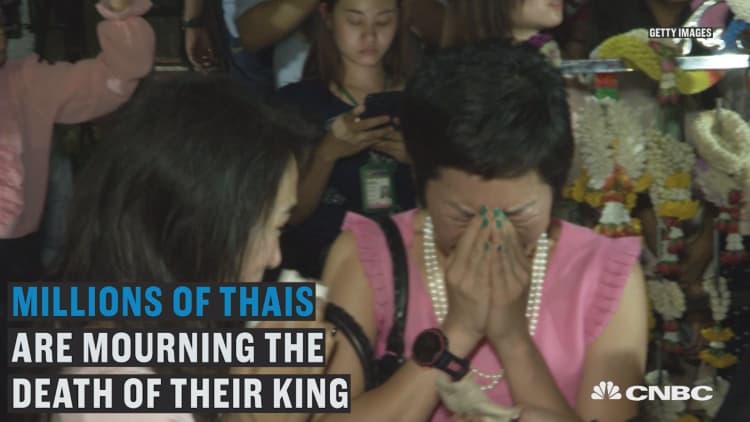Respect for the dead is usually assumed, but the death of Thailand's King Bhumibol Adulyadej is commanding much more than that. Even if Thais are given to expressing their grief quietly, but deeply, the national outpouring of sorrow is visceral. As it would be for someone with such mythical stature.
It is hard to make a cold-eyed assessment of such a figure, partly because of Thailand's draconian lese majeste laws, which render any commentary on the monarchy (or worse, individual members of the royal family) extremely dangerous to a reporter's continued existence. But also partly because it risks speaking ill of the dead, especially of someone who was beloved by millions.
The issue, in my mind, is this elevation to demi-god status. Because the Thai concept of king as god-man is actually a reasonably modern creation.

It began in the late 1950s under strongman prime minister Field Marshall Sarit Thanarat, who seized the opportunity to commandeer the then young, extremely Westernized and not-yet politicized King Bhumibol to give legitimacy to his government's own plans.
It's a play we've seen many times before. Deification began with beatific portraits and photographs of the king, which still now hang everywhere, from government offices to even the houses of the smallest villages. And grew larger from there so that an entire mythology evolved around the king's personal goodness and love for the nation and his subjects.
It would be cruel to diminish the king's many achievements in rural agriculture and development. He was not simply a weak, installed puppet. To paraphrase The New York Times' apt description of him decades ago, Bhumibol didn't quite rule, but certainly did more than reign. An unusual role for most constitutional monarchies.
King Bhumipol's passing is the end of an era in which almost all Thais have known no other monarch. It is also the beginning of a very uncertain new era, and possibly the beginning of the end of the Thai monarchy as we've come to know it.
Much as many Thais have a reverence for their late king that borders on worship, many other increasingly progressive, better educated citizens are ready for a modern constitutional monarchy.
It's not that they believe the emperor has no clothes. It's more that they understand he was a man, after all.


